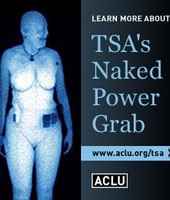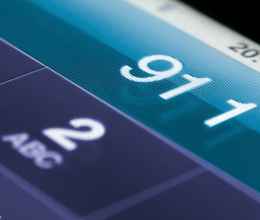This is intended as a guide to procedures and technologies you may encounter in your travels. Much of the information here is based on DHS internal policy--not law--so it is subject to change and inconsistent application. If you encounter different policies at the airport or feel your rights are being violated, please contact the ACLU.
Learn more about the TSA's naked power grab at the ACLU Airport Security page.
Scanning
Many airports now require passengers to go through a scanner that uses advanced imaging technology. The scanner uses radiation to provide agents with an electronic image of your naked body. Although TSA says that the capability to store and transmit images of passengers' bodies will not normally be activated, the agency requires this functionality in all the airport scanners it purchases.These scanners are known by a variety of names:
- "Advanced Imaging Technology" (AIT) scanners
- "Whole Body Imaging" (WBI) scanners
- "full-body" scanners
- "naked" scanners
Option: Ask not to go through this scanner
You can tell the TSA agent that you do not wish to go through the scanner. TSA agents are required under TSA policy to honor your request, but might try to encourage or pressure you to go through anyway. To be as clear as possible, say, "I opt out." If you opt out, you will be subject to a “standard pat-down.”
You also have the right to opt your children out of the scan.
The "standard pat-down"
The TSA's "standard pat-down procedure" is now a more invasive form of the pat-down search that you might have experienced in the past.TSA says that during the new standard pat-down, a screener of the same sex will examine your head, shirt collar area, and waistband, and may use either the front or back of his or her hands to feel your body, including buttocks, around breasts, and between the legs, feeling up to the top of the thigh. Women in tight skirts that don't allow an agent to feel the thigh area may be asked to remove the skirt in a private screening area and will be given a gown or towel to put on.
Option: Let TSA know about sensitive areas
Tell TSA agents about things such as injuries or conditions that could cause you pain if certain parts of your body are touched or pressed, as well as any medical devices that could be dislodged by a search, or any other reason that TSA agents should be careful when touching your body.Option: Ask to be patted down in a private location
If you are uncomfortable being patted down in front of other passengers, you can request that TSA agents take you to a private area.The "resolution pat-down"
If an "anomaly" is detected during the pat-down--or when you go through the AIT scanner--you will be subjected to a "resolution pat-down." TSA agents will take you to a private area and do a more intense pat-down, which includes using the front of the agent's hands for a more thorough search, including the groin area.Option: Ask to take a witness with you.
If you are taken to a private area for a "resolution pat-down" search, you can ask to bring a witness with you, or ask TSA to provide a witness for you. This search should also be conducted by a person of the same gender.Other Things to Know
Traveling with Children
While you may opt your children out of an airport scan, there is no exemption for children from the pat-down searches. TSA says it must “screen everyone, regardless of age (even babies).”Religious Head Coverings
Option: Tell TSA about religious head coverings
If your religion does not allow you to remove your head covering, you can tell TSA officials. They may ask you to pat-down your headwear, then rub your hands with a cloth and place it in a machine to test for chemical residue. If the TSA official still wants you to remove your religious head covering, you have the right to ask to do this in a private area.
Searches of Bags, Laptops, and Electronics
U.S. Customs and Border Protection (CBP) claims the right to search and confiscate laptops, mobile phones, digital cameras, and other electronic devices upon entry to the United States, without any suspicion of wrongdoing. In some reported cases, CBP has held travelers' electronics for more than a year.
The ACLU and other organizations have filed a lawsuit challenging these searches.
Option: Ask to see a supervisor, and get a receipt
You have the right to have the initial search conducted in front of a supervisor. If they take your electronics, you can ask for a receipt so you can track where they are and seek their return.Fingerprinting
All visitors and lawful permanent residents are fingerprinted on entry into the U.S. from abroad.Border Interrogations
Customs and Border Protection (CBP) officials have the authority to ask your immigration status when you are entering or returning to the United States or leaving the country. They have the power to determine whether or not non-U.S. citizens and lawful permanent residents have the right of entry.
Law enforcement officials reportedly ask some people about their political and religious beliefs, where they worship, and how often they pray. The ACLU believes that such questions are inappropriate.
Option: Decline to answer
If you think you are being asked inappropriate questions, you may say, "I am sorry. I believe you are asking me questions about my protected religious and/or political beliefs and practices. I do not wish to answer these questions." This may cause you delay, but is permissible.Option: Ask to speak to a supervisor
If you think you are being asked inappropriate questions, you can ask to speak to a supervisor--but be aware that this might cause you further delay. Also ask to speak to a supervisor if you are denied the right to use a restroom or to have family or friends told where you are. You may also file a complaint with the Civil Rights Office of the Department of Homeland Security if you have been held for a long time, asked inappropriate questions, or treated inhumanely. See below.Option: Ask to have an attorney present
If you are selected for a longer interview by law-enforcement officials and you are a U.S. citizen, you have the right to have an attorney present. If you are not a U.S. citizen, you generally do not have the right to an attorney when you are having an extended interview.Option: Ask for help
If you are delayed a considerable length of time, you can ask CBP officials to allow you to make a call, or make a call for you.Asylum
If you are told you cannot enter the country and fear you might be persecuted or tortured if sent back to the country you traveled from, you can tell the official about your fear and ask for asylum.How to Complain
Tell the ACLU
The ACLU might be able to help you file your complaint or try to get an answer. Call your local ACLU affiliate for assistance.
You may also file a complaint online:
http://www.aclu.org/technology-and-liberty/tsa-pat-down-search-abuse
File a Complaint with the Department of Homeland Security
You can file a complaint with the Office for Civil Rights and Civil Liberties of the U.S. Department of Homeland Security if you have had any of the following problems:- being detained for long periods of time when coming back to the country;
- being asked inappropriate questions when returning to the U.S.;
- being treated differently at airports and ports of entry because of your race, religion, or national origin;
- being forced to go through the AIT scanners at airports, even though you have told agents you do not wish to go through;
- being patted down in an inappropriate manner;
- if you believe your rights have been violated in any other way.
- repeatedly being delayed when trying to board an airplane because of security concerns; or
- being told you are on a list and not being allowed to fly.
- your name;
- date of birth;
- phone number;
- mailing address;
- email address;
- a written description of the incident, giving as much detail as possible, including (if available) the name and agency of the individual(s) alleged to have committed the violation.
By mail or phone The Office for Civil Rights and Civil Liberties U.S. Department of Homeland Security Building 410, Mail Stop #0190 Washington, DC 20528
Phone: 202-401-1474 Toll Free: 1-866-644-8360 TTY: 202-401-0470 Toll Free TTY: 1-866-644-8361 Fax: 202-401-4708
By e-mail crcl@dhs.gov
Online
Travler Redress Inquiry Program (DHS TRIP)
http://www.dhs.gov/files/programs/gc_1169676919316.shtm






